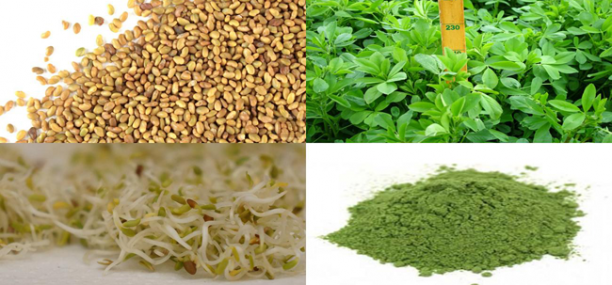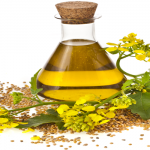Nutrition facts and Nutritional information of Alfalfa
Alfalfa (Medicago sativa or lucerne, люцерна) is a renowned tonic all around the world. Global herbal companies use this natural product of nature as an ingredient in their own products. In herbal medicine, the usage of the mother tincture of Alfalfa is highly popular, as it is an excellent source of physical and mental energy.
Alfalfa is a perennial cultivated plant species in the genus Fabaceae.
Alfalfa (leaf and fruit) contains a broad spectrum of healthy nutrients including considerable quantities of protein, minerals and vitamins, as well as it contain enormous amounts of dietary fiber and chlorophyll that serves as a natural antioxidant in the bloodstream.
The deep root system in alfalfa absorbs minerals from the soil resulting in a plant rich in vitamins and minerals and a great source of fiber and protein.
Alfalfa leaf is rich in protein and fat-soluble vitamins A, D, E, and K.
Alfalfa seeds are high in vitamin A essential for vision (vitamin A preserves normal vision as it is a cofactor in the synthesis of cons as well as it plays an important role in preserving the rods mandatory for night vision) and vitamin C, an antioxidant that helps in boosting the immunity and promotes cardiovascular and skin health. Alfalfa (seeds and sprouts) is also a good source of fibers that reduces cholesterol levels, helps in preventing cardiovascular disease, and promotes a healthy intestinal tract
Alfalfa extract is a good source of chlorophyll and carotene (carotenoids). It is important to insist on certified organic alfalfa, since the plant nature and its deep root system concentrates cadmium, copper, lead, nickel, and zinc when grown in contaminated soils. The leaves contain eight essential amino acids.
Recommendations
Alfalfa contains large amounts of vitamin K (a cofactor in blood clot formation). Thus it may reduce the effect of Warfarin (Coumadin) a drug used to slow blood clotting, if you are a patient on Coumadin and a lover of alfalfa, make sure to check your blood regularly as your optimal dose of warfarin might need to be changed
Alfalfa might have the same effects estrogen (a female sexual hormone). If you suffer of any condition that can worsen by estrogen (breast cancer, endometriosis, uterine fibroids, uterine cancer or ovarian cancer), it is preferable not to eat alfalfa.
Also, if you take birth control pills consider revising, as taking alfalfa along with birth control pills might decrease the effectiveness of birth control pills and thus you must seek an alternative form of birth control such as a condom.
Recommendation list
- Intended for stressed men and women
- For men with erectile debility, for those suffering of early ejaculation, and neurasthenia
- For expectant women and lactating mums
- For convalescent levels of throwing up following viral ailments
- For serious chronic diarrhea
- For individuals with chronic weakness, loss of appetite, poor development, restlessness, fatigue and for students engaged with hard work.
For reducing high cholesterol levels: a typical dose is 5 to 10 grams of the herb, or as a steeped strained tea, three times a day. Alternatively, 5 to 10 ml of alfalfa liquid extracts (1:1 in 25% alcohols) three times a day has proven success.
Alfalfa seeds are commonly used as a supplement to lower cholesterol at doses of 0.75 to 3g/day. However, this needs further studies and evaluation.
Intake and usage
Alfalfa can be taken in capsules, as a tea or as fresh raw sprouts (make sure to rinse them thoroughly to remove mold before eating them). Alfalfa tea is mild and good tasting, and blends well with many other tonic herbs like mints and/or citrus.
The needle-like sprouts are salad and sandwich staples, while alfalfa leaves and flowers are herbal tea ingredients (holding the best healing potentials), for a maximum boost of energy drink up to three cups of alfalfa tea a day. Traditionally, alfalfa has been always used as a natural appetizer as well as to ease indigestion, while alfalfa seeds were made into a paste for treating localized skin inflammation (insect bites and boils).
Verified by: Dr.Diab (June 28, 2017)
Citation: Dr.Diab. (June 28, 2017). Nutrition facts and Nutritional information of Alfalfa. Medcoi Journal of Medicine, 3(2). urn:medcoi:article18246.














There are no comments yet
Or use one of these social networks